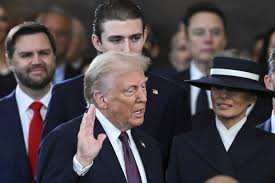
Introduction
The use of profanity in political discourse has a rich history, but few figures have pushed the boundaries as far as former U.S. President Donald Trump. His penchant for swearing has ignited discussions about political decorum, the effectiveness of blunt communication, and the influence it has on his supporters and critics alike. As political polarization rises, understanding the implications of Trump’s linguistic choices is increasingly relevant.
Trump’s Swearing in Public Life
Throughout his presidency and beyond, Trump has made headlines for his colorful language. Instances of swearing have emerged in various contexts, from campaign rallies to official speeches. During a rally in 2016, Trump infamously incorporated vulgar phrases to emphasize his frustrations with the political establishment. Such moments have resonated with certain voter demographics who appreciate his authenticity and straightforwardness.
Public Reaction and Media Coverage
The media has extensively covered Trump’s use of profanity, often contrasting it with traditional political communications that favor more reserved language. While some applauded his candidness as refreshing and relatable, others criticized it as inappropriate for a leader. Polls have indicated that a significant portion of Trump’s base admires his disregard for conventional decorum, viewing it as a signal of his fight against political correctness.
Implications for Future Political Leaders
The consequences of Trump’s swearing extend beyond his own political career. Emerging political figures, particularly those aligning themselves with Trumpism, face the challenge of navigating a landscape where traditional language may seem outdated. The normalization of swearing in political rhetoric may encourage future candidates to adopt similar strategies to resonate with voters, potentially leading to a new era of political expression.
Conclusion
As society continues to grapple with the implications of Trump’s unique communication style, the debate surrounding swearing in politics will remain central to discussions about leadership and decorum. Observers predict that the acceptance of more casual and profane language in public discourse may persist, reshaping the expectations of future political figures. Whether one views this trend as beneficial or detrimental, it undeniably reflects a larger shift in cultural norms surrounding authority and communication.



